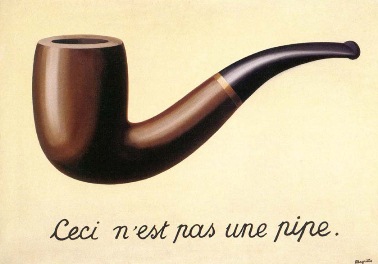Irrelevant whether someone untrained can tell. Someone untrained can't tell cancer from a scan either. But the scan is still objective evidence of the cancer.
Mary's room is fun, but ultimately misleading.
Take 2:
So the objective representation of the subjective means that the subjective is objective. That is what we are playing.
So here are 3 ways of understanding this:
- Reality is ultimately physical.
- Reality is ultimately mental.
- Reality is a combination of the 2 and you can't reduce reality down to being the one or the other.
The representation of something is never not the something as such. It is a representation. And now here we are playing the following game:
You in effect: The model captures the landscape perfectly and there is nothing left out in the model, because the model is in effect equal to the landscape.
So let me explain what it is that you don't get. This rule of yours is not in the landscape. You can't see it as a part of the landscape. It is as a rule itself, which is not able to be represented in the landscape. The rule has no objective referent. In practice you know something, which is not objective and it can't be understood by representing the landscape.
In other words you use a mental rule and don't get that it is a mental rule. But that is the point, because it is possible to use another mental rule about how the physical and mental relate to each other. But I know what will happen now. You will claim it is not useful. But the joke is that "useful" is again mental and not physical. When you say "useful", you say something, which has no objective referent.
So here it is in all its absurdity. You use a subjective model of how to represented the physical and mental without acknowledging that your model is subjective. And I won't present you with other way of doing it, before you realize what you are doing. You are using a subjective standard for useful and as long as you don't full accept that it is subjective, there is no need to continue. How is that? Because you will continue in effect to be subjective without acknowledging that you are subjective.
That is the game we are playing. You as a member of STEM have been subjectively trained to use your brain in a certain way. You can for some aspects of reality use objectivity, but you are functionally unable to understand the limit of that, because you are conditioned to think in objective terms, that you don't realize the limit of your training.
In short - you have a subjective rule that it has to be objective to make sense, but that is subjective. That is the joke, you can't relevant for this catch, hold, examine and understand your own cognition for when it is subjective and not objective.
I can relevant for these kind of debates do that, because I was trained differently. So it doesn't mean. that you are wrong or right nor the same for me. There is no kind of "the truth" in these debates, because we are playing limited cognitive relativism.
That is where it always ends. You want to reduce all of reality down to being objective and you don't get, that the fact that you want that, is subjective.
You in effect don't get that there is a variant of truth, which is subjective and all you do, is to subjectively demand that truth has to be objective in all cases for you to subjectively accept that, because the subjective definition of truth is that it is objective. And in circles we then go. And as long as it doesn't in effect clicks in your brain and you understand the limitations in practice of science in regards to the subjective, we will go on.
That is it. Nobody in the recorded history of accumulated attempts of doing what you are also trying to do have succeed in the following: To make a model of all of the landscape where there is only one kind of truth, the truth. You are in the end doing philosophy and you don't realize that, because you think that you can turn STEM into philosophy, because you know STEM works. You just don't get the limitation.
In other words, in practice philosophy can only give a negative answer:
You can't make a model of the landscape with only one kind of truth, the truth. As long as you don't get that, we can't proceed to debating what we do instead.
Regards and love
Mikkel

